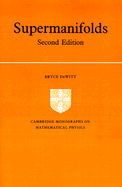Preface to the second edition
Published online by Cambridge University Press: 01 June 2011
Summary
At the end of the fifth and last chapter of the first edition the author wrote that if the book were ever to be revised it would include an account of the beautiful work of E. Witten and of L. Alvarez-Gaumé on supersymmetry, Morse theory and the Atiyah–Singer index theorem. Chapter 6 of this revised edition is a partial fulfilment of the promise. The aim of chapter 6, like that of chapter 5, is almost exclusively pedagogical. Unlike chapter 5, however, chapter 6 deals with nontrivial supermanifolds, and the author discovered that there are numerous fine points in the theory of the Feynman functional integral for such supermanifolds that are not adequately covered in the literature, even on a formal level. To be pedagogically helpful the book has to deal with these issues, given the fact that, despite the essential role it plays in chapter 6, the functional integral is used in a formal way rather than as a rigorous tool. This has meant that, in order to keep the reader's confidence, the author has had to expend a large part of his effort on the functional integral itself and hence could include only a little of the flavor of the index theorem, as it touches the Euler–Poincaré characteristic. The effort to display the internal consistency of the functional integral formalism has nevertheless been useful in that it presents a challenge to the student to attempt what must surely be possible, namely, to establish the functional integral at last on a fully rigorous basis for both bosonic and fermionic systems.
- Type
- Chapter
- Information
- Supermanifolds , pp. xviiiPublisher: Cambridge University PressPrint publication year: 1992



